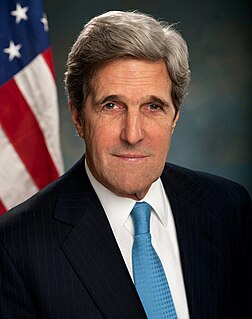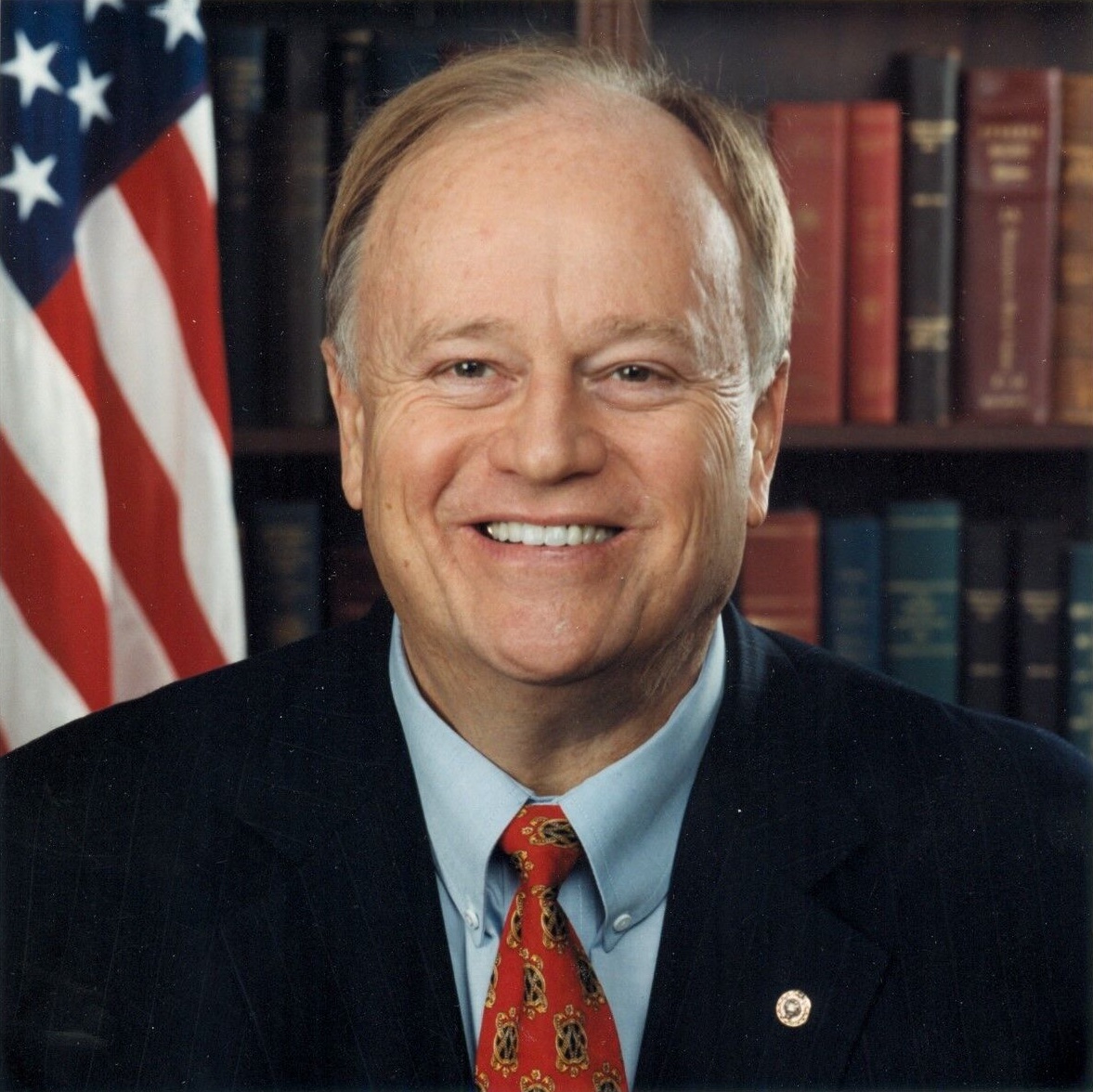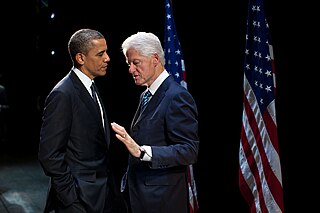
The Democratic Leadership Council (DLC) was a non-profit 501(c)(4) corporation founded in 1985 that, upon its formation, argued the United States Democratic Party should shift away from the leftward turn it took in the late 1960s, 1970s, and 1980s. One of its main purposes was to win back white middle class voters with ideas that addressed their concerns. The DLC hailed President Bill Clinton as proof of the viability of Third Way politicians and as a DLC success story.
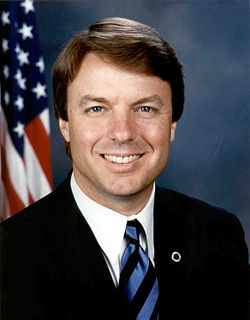
The 2004 Democratic presidential primaries were the selection process by which voters of the Democratic Party chose its nominee for President of the United States in the 2004 U.S. presidential election. Senator John Kerry of Massachusetts was selected as the nominee through a series of primary elections and caucuses culminating in the 2004 Democratic National Convention held from July 26 to July 29, 2004, in Boston, Massachusetts. Kerry went on to lose the general election on November 2, 2004, to incumbent Republican President George W. Bush.

The 2004 United States Senate elections were elections for one-third of the seats in the United States Senate which coincided with the re-election of George W. Bush as president and the United States House election, as well as many state and local elections. Senators who were elected in 1998, known as Senate Class 3, were seeking re-election or retiring in 2004. This was the third consecutive election for Senate Class 3 where the Democrats failed to end up with a net gain. This also marked the first time since 1980 in which a presidential candidate from either party won with coattails in the Senate. As of 2018, these are the last elections held during a Presidential election year in which the Republicans made a net gain of seats.

The 2008 United States presidential election was the 56th quadrennial presidential election. It was held on Tuesday, November 4, 2008. The Democratic ticket of Barack Obama, the junior Senator from Illinois, and Joe Biden, the senior Senator from Delaware, defeated the Republican ticket of John McCain, the senior Senator from Arizona, and Sarah Palin, the Governor of Alaska. Obama became the first African American ever to be elected as president.

The 2004 presidential campaign of John Kerry, the long-time U.S. Senator from Massachusetts who would eventually become the 68th U.S. Secretary of State eight years later, began when he formed an exploratory committee on December 1, 2002. On September 2, 2003, he formally announced his candidacy for Democratic Party nomination. After beating running mate John Edwards, Howard Dean, Wesley Clark, and other candidates in the primaries, he became the Democratic nominee, with his challenger being Republican incumbent President George W. Bush in the 2004 presidential election. Kerry conceded defeat in the race in a telephone call to Bush at around 11 a.m. EST on the morning of November 3, 2004.
George W. Bush had one major opponent, U.S. Sen. John F. Kerry (D-Mass.), whose primary campaign was successful in securing the majority of Democratic delegate votes. For his presidential campaign, see John Kerry presidential campaign, 2004.

The 2004 United States presidential election, the 55th quadrennial presidential election, was held on Tuesday, November 2, 2004. Incumbent Republican President George W. Bush defeated Democratic nominee John Kerry, a United States Senator from Massachusetts.
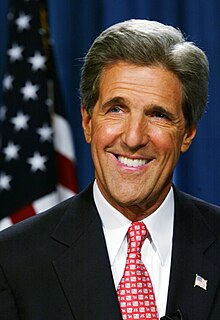
The 2004 United States presidential election in New Jersey took place on November 2, 2004, and was part of the 2004 United States presidential election. Voters chose 15 representatives, or electors to the Electoral College, who voted for president and vice president.

The 2004 United States presidential election in Connecticut took place on November 2, 2004, and was part of the 2004 United States presidential election. Voters chose 7 representatives, or electors to the Electoral College, who voted for president and vice president.

The 2004 United States presidential election in North Carolina took place on November 2, 2004, and was part of the 2004 United States presidential election. Voters chose 15 representatives, or electors to the Electoral College, who voted for president and vice president.

The 2004 United States presidential election in Tennessee took place on November 2, 2004, and was part of the 2004 United States presidential election. Voters chose 11 representatives, or electors to the Electoral College, who voted for president and vice president.
The following is a timeline of major events leading up to and immediately following the United States presidential election of 2008. The election was the 56th quadrennial United States presidential election. It was held on November 4, 2008, but its significant events and background date back to about 2002. The Democratic Party nominee, Senator Barack Obama of Illinois, defeated the Republican Party's nominee, Senator John McCain of Arizona.

The United States Senate election in New Hampshire was held on November 4, 2008. Incumbent Republican U.S. Senator John E. Sununu ran for re-election to a second term, but was defeated by Democrat Jeanne Shaheen in a rematch of the 2002 election. Shaheen's win ended 30 years of Republican control of this Senate seat.

The 2004 United States presidential election in South Carolina took place on November 2, 2004, as part of the 2004 United States presidential election which took place throughout all 50 states and D.C. Voters chose eight representatives, or electors to the Electoral College, who voted for president and vice president.

This article lists those who were potential candidates for the Republican nomination for Vice President of the United States in the 2008 election. On March 4, 2008, Senator John McCain of Arizona won a majority of pledged delegates for the Republican nomination for President of the United States, and became the presumptive nominee.

The 2008 United States presidential election in Florida took place on November 4, 2008, and was part of the 2008 United States presidential election. Voters chose 27 representatives, or electors to the Electoral College, who voted for president and vice president.
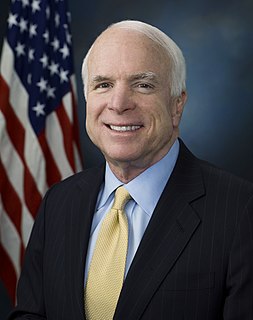
The 2008 United States presidential election in South Carolina took place on November 4, 2008, and was part of the 2008 United States presidential election. Voters chose 8 representatives, or electors to the Electoral College, who voted for president and vice president.

This article lists those who were potential candidates for the Democratic nomination for Vice President of the United States in the 2000 election. Incumbent Vice President Al Gore won the 2000 Democratic nomination for President of the United States, and chose Connecticut Senator Joseph Lieberman as his running mate on August 7, 2000. Lieberman, a two-term centrist Democratic Senator, was chosen for being "tough on defense" and foreign policy issues. Lieberman was the first Jew chosen for a national ticket. The choice of Lieberman was announced shortly before the 2000 Democratic National Convention. Former Secretary of State Warren Christopher led the vetting process. The Gore-Lieberman ticket ultimately lost to the Bush-Cheney ticket. Coincidental to the presidential election, Lieberman was re-elected to a third term as Senator from Connecticut.
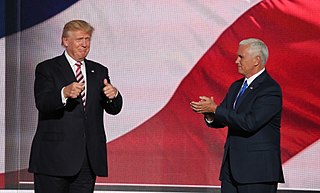
This article lists potential candidates for the Republican nomination for Vice President of the United States in the 2016 United States presidential election. Businessman Donald Trump of New York, the 2016 Republican nominee for President of the United States, considered several prominent Republicans and other individuals before selecting Governor Mike Pence of Indiana as his running mate on July 15, 2016. Pence formally won the vice presidential nomination on July 19, 2016, at the 2016 Republican National Convention. As the Trump-Pence ticket won the 2016 presidential election, Pence became Vice President of the United States on January 20, 2017.
The 2020 Republican Party presidential primaries and caucuses will be a series of electoral contests taking place within all 50 U.S. states, the District of Columbia, and five U.S. territories. Sanctioned by the Republican Party, these elections are designed to select the 2,472 delegates to send to the Republican National Convention, who will select the Republican Party's nominee for President of the United States in the 2020 election. The delegates also approve the party platform and vice-presidential nominee.

